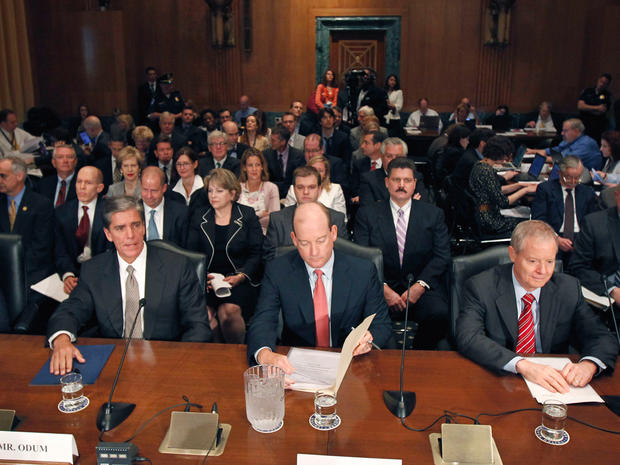Senate blocks bill repealing $2B in oil tax breaks
The Senate has blocked a bill to repeal about $2 billion a year in tax breaks for the five biggest oil companies, a Democratic measure meant to respond to huge industry profits and $4-a-gallon gas prices.
The bill was defeated Tuesday on a procedural vote, but Democrats hope to revive the measure later this year when lawmakers and the Obama administration negotiate a deficit-reduction package.
Democrats say the savings, which amount to about $2 billion a year, would help lower the deficit.
"We have to do something about the exorbitant gas prices, and the best way to start with that is to do something about the five big oil companies getting subsidies they don't need," said Senate Majority Leader Harry Reid. "The other thing we have to be concerned about are the huge deficits that we've had, and we can accomplish both of those to some degree today by doing something this evening when we vote on taking away those huge subsidies the oil companies no longer need."
The Democratic measure, the "Close Big Oil Tax Loopholes Act," is sponsored by Senators Robert Menendez, D-NJ, Claire McCaskill, D-MO, and Sherrod Brown, D-OH. It is not expected to get the 60 votes necessary to advance the bill in the Senate.
Republicans oppose the bill because they say it does nothing to lower gas prices and is not a serious effort to address the problem.
"Symbolic votes like this that aim to do nothing but pit people against each other will only frustrate the public even more," Senate Majority Leader Mitch McConnell said.
"Americans really aren't interested in scapegoats," he continued. "They just want to pay less to fill up their cars. That's why this Democratic bill to tax American energy is an affront to the American people."
It's not only Republicans who oppose the bill. Democratic senators representing oil producing states, like Mary Landrieu of Louisiana and Mark Begich of Alaska, have been vocal opponents of the bill.
Landrieu says it's a waste to spend so much time on a bill that no one expects to pass and that won't address prices at the pump.
She urged Congress to work on what she cast as real solutions to the energy prices.
"It might make us feel better to beat up on big oil. It might present a scapegoat in some quarters, but it will not lower prices at the pump and that's what we need to be about," Landrieu said. "This economy, our economic recovery that we're in, slow and spotty in places, but underway, can be stalled out by prices as high as $4.37-a -gallon."
Landrieu asked her colleagues why they want to hurt an industry that employs millions of Americans.
"Why are we doing it? Why are we harming an industry, five large oil and gas companies that work internationally, that employ 9.2 million people in the United States directly, that are good hard working Americans, working in and for these companies?" she asked.
Begich called the legislation a gimmick.
"Let's stop the headline grabbing and get serious about the energy security," he said. "There is a lot of talk right now but ending tax incentives for oil and gas industry, but the high profits right now of these companies are easy targets. One thing Alaskans know, just because you have an easy target doesn't mean it is the right thing to shoot. It won't decrease prices at the pump for our families and small businesses."
In addition to Senators Landrieu and Begich, there are a few other Senate Democrats that could oppose the bill. Senator Ben Nelson, D-NE, office says he is still studying the bill and hasn't yet decided how he will vote.
There are 53 senators who caucus with Democrats. Without the support of 60 senators the bill will die on a procedural vote.
